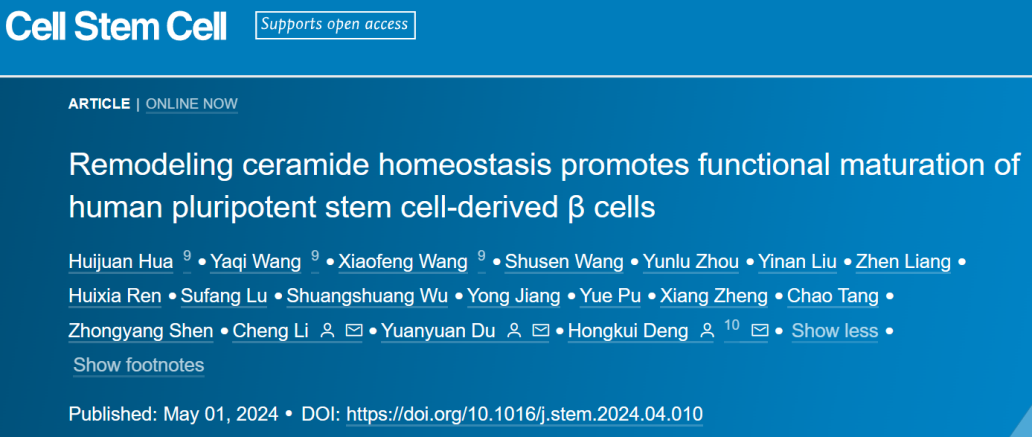
Human pluripotent stem cell-derived beta cells (hPSC- β cells) show the potential to restore blood sugar.
However, the immature function of hPSC- β cells limits its application. On May 1st, 2024, Deng Hongkui and Li Cheng of Peking University and du Yuanyuan of Hangzhou Institute of Medicine of Chinese Academy of Sciences jointly published a research paper entitled "Remodeling ceramide homeostasis promotes functional maturation of human pluripotent stem cell-derived β cells" on Cell Stem Cell. This study analyzed the process of functional maturation of insulin secreting cells (islet β cells) derived from human pluripotent stem cells, and expounded the regulation mode of islet β cell functional maturation. On this basis, the research team predicted a library of small molecular compounds by targeting factors that regulate islet β cell maturation. After screening, it was found that HDAC inhibitor TH34 can effectively promote the functional maturation of islet β cells in vitro.

Diabetes is a serious threat to human health. For patients with insulin-dependent diabetes, the commonly used exogenous insulin injection is difficult to achieve accurate regulation of blood glucose, which leads to a variety of complications and seriously affects the quality of life of patients. Clinical islet transplantation can make patients get rid of insulin injection completely and cure the disease. However, the scarcity of human primary islet tissue greatly limits the application of islet transplantation.
Human pluripotent stem cells have the ability of stable self-renewal in vitro and the potential to differentiate into various human cells, so they are ideal seed cells for a large number of human cells in vitro. However, the functional cells differentiated by human pluripotent stem cells are generally faced with the problem of immature cell function and cell state similar to embryonic development, which limits the application of functional cells derived from human pluripotent stem cells in vivo and in vitro. Previous studies have shown that immature cells gradually acquire the function of mature cells after in vivo transplantation, and this in vivo maturation process provides a feasible alternative to the study of functional maturation of human cells, which can enhance the overall understanding of late development and promote the formation of mature cells from hPSCs. Therefore, how to obtain functionally mature human cells in vitro is an important scientific problem in the field of pluripotent stem cell differentiation.
HPSCs-derived islets can restore endogenous insulin secretion by replenishing pancreatic β-cells, which is a necessary condition for maintaining circulating glucose concentration within a narrow physiological range by regulating insulin output. However, a common dilemma of hPSCs-derived β cells (hPSC- β cells) is their immature function, such as gene expression profile, transcriptional entropy, intracellular Ca2+ oscillation, mitochondrial respiration and insulin secretion. After transplantation into rodent or primate models, hPSC- β cells gradually matured and showed considerable improvement in cellular function, similar to the function of β cells in adult islets. Therefore, elucidating the mechanism of this maturation process in vivo will provide valuable insights into the functional acquisition of human pancreatic β cells and facilitate the production of hPSC- β cells matured in vitro.

Mechanism model diagram
This study uses single cell multiplex analysis to decipher the maturation process of hPSC- β cells after transplantation and predicts that small molecules that improve the function of hPSC- β cells can be improved by targeting upstream regulatory factors involved in functional maturation. By establishing a developmental continuum in vivo, the researchers described the landscape of human β-cell maturation based on human hematopoietic stem cells, which showed the importance of lipid metabolism, especially ceramide homeostasis in β-cell maturation. The regulation of intracellular ceramide concentration by small molecular TH34 can significantly improve the function of hPSC- β cells. In summary, this study provides insights into the maturation of human pancreatic β-cells and emphasizes the importance of ceramide homeostasis in functional acquisition.
Deng Hongkui's team has been studying the directional differentiation of human pluripotent stem cells into islet cells for many years. In 2005, his laboratory established the world's first step-by-step induction method to directionally differentiate mouse pluripotent stem cells into islet β cells (Shi et al., Stem Cells, 2005). In 2007, his laboratory established the first chemically defined human islet directed differentiation program (Jiang et al., Cell Res, 2007). Then, the induction and differentiation of human pluripotent stem cells and monkey pluripotent stem cells into islet β cells were continuously optimized (Zhang et al., Cell Res, 2009 Jiang et al., Diabetologia, 2011 Liu et al., Cell Res, 2014). In 2022, Deng Hongkui's team pioneered human cytochemical reprogramming (chemical reprogramming), in which terminally differentiated somatic cells can be reversed into early embryonic pluripotent stem cells using only exogenous chemical small molecules. This chemically reprogrammed human pluripotent stem cells are called human CiPS cells (human chemical induced pluripotent stem cells) (Guan et al., Nature, 2022). Using human CiPS cells, Deng Hongkui's team greatly improved the differentiation scheme of human pluripotent stem cells into islet cells, and transplanted human pluripotent stem cell differentiated islet cells into non-human primate diabetic animal model. The safety and efficacy of human pluripotent stem cells in the treatment of diabetes were systematically evaluated (Du et al., Nature Medicine, 2022 Liang et al., Nature Metabolism, 2023), which laid a foundation for clinical trials.
The scheme found in this study to promote the functional maturation of islet β cells will help the field to more effectively prepare mature human pluripotent stem cell derived islet cells in vitro, and provide higher quality differentiated islet cells for clinical cell replacement therapy of diabetes in the future.
Dr. Liu Huijuan of Deng Hongkui's research group, Wang Yaqi, a doctoral student of Li Cheng's research group, and Wang Xiaofeng, Deng Hongkui's project technician, are the co-first authors of this article. The research was strongly supported by Professor Tang Chao of Peking University, Professor Shen Zhongyang and Professor Wang Shusen of Tianjin first Central Hospital.